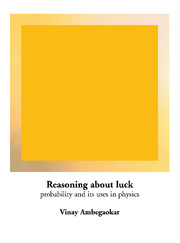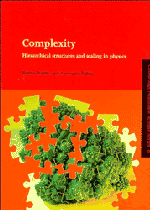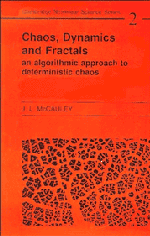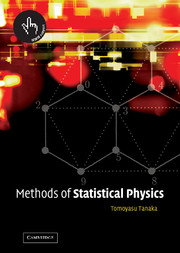Reasoning about Luck
This book introduces the reader to statistical reasoning and its use in physics. It is based on a course taught to non-science majors at Cornell, and differs from other treatments by its wide-ranging use of quantitative methods, which are built up in a constructive way and assume only that the reader can add, subtract, multiply and divide with confidence. The author begins with a self-contained introduction to the everyday uses of probability, including the quantitative assessment of statistical information. Following a chapter on useful mathematical concepts, he develops the basic ideas of mechanical motion, the molecular theory of gases, entropy as a measure of molecular agitation, limitations on the conversion of heat to work, the physics of the direction of time, chaos, and the role of probability in quantum mechanics. To aid self-instruction, there are solved problems at the end of each chapter.
- High profile author and department
- Unique and imaginative approach to physics
- Assumes no prior knowledge of calculus or advanced maths
- Suitable for introductory undergraduate physics courses
Reviews & endorsements
'Reasoning about Luck uses no mathematics beyond basic algebra and geometry. It is unusually well written, and the author's dry sense of humour considerably increased my pleasure in reading it … would be a superb choice for an upper-division honors seminar aimed at students from all the sciences or as supplementary reading in an undergraduate course in modern physics … In thinking carefully about the minimum knowledge of physics that an educated citizen should have, Ambegaokar has made a real contribution to the discussion. In addition, he has produced a thoroughly enjoyable physics book.' Ruth Howes Physics Today
Product details
No date availablePaperback
9780521447379
248 pages
248 × 174 × 14 mm
0.512kg
43 b/w illus.
Table of Contents
- Preface
- 1. Introduction
- 2. The likely, the unlikely, and the incomprehensible
- 3. Normality and large numbers
- 4. Examples
- 5. A little mathematics
- 6. Forces, motion, and energy
- 7. Atoms, molecules, and molecular motion
- 8. Disorder, entropy, energy and temperature
- 9. Heat, work, and putting heat to work
- 10. Fluctuations and the arrow of time
- 11. Chaos
- 12. Quantum jumps: the ultimate gamble.






